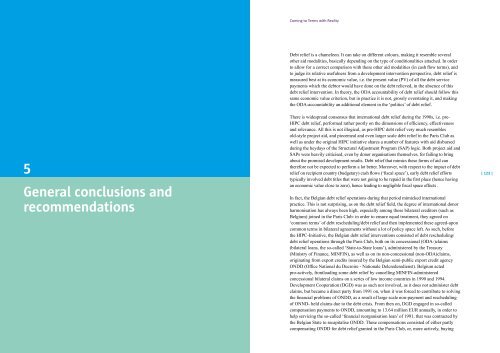Coming to Terms with Reality. Evaluation of the Belgian Debt Relief ...
Coming to Terms with Reality. Evaluation of the Belgian Debt Relief ...
Coming to Terms with Reality. Evaluation of the Belgian Debt Relief ...
Create successful ePaper yourself
Turn your PDF publications into a flip-book with our unique Google optimized e-Paper software.
5<br />
General conclusions and<br />
recommendations<br />
<strong>Coming</strong> <strong>to</strong> <strong>Terms</strong> <strong>with</strong> <strong>Reality</strong><br />
<strong>Debt</strong> relief is a chameleon. It can take on different colours, making it resemble several<br />
o<strong>the</strong>r aid modalities, basically depending on <strong>the</strong> type <strong>of</strong> conditionalities attached. In order<br />
<strong>to</strong> allow for a correct comparison <strong>with</strong> <strong>the</strong>se o<strong>the</strong>r aid modalities (in cash flow terms), and<br />
<strong>to</strong> judge its relative usefulness from a development intervention perspective, debt relief is<br />
measured best at its economic value, i.e. <strong>the</strong> present value (PV) <strong>of</strong> all <strong>the</strong> debt service<br />
payments which <strong>the</strong> deb<strong>to</strong>r would have done on <strong>the</strong> debt relieved, in <strong>the</strong> absence <strong>of</strong> this<br />
debt relief intervention. In <strong>the</strong>ory, <strong>the</strong> ODA accountability <strong>of</strong> debt relief should follow this<br />
same economic value criterion, but in practice it is not, grossly overstating it, and making<br />
<strong>the</strong> ODA-accountability an additional element in <strong>the</strong> ‘politics’ <strong>of</strong> debt relief.<br />
There is widespread consensus that international debt relief during <strong>the</strong> 1990s, i.e. pre-<br />
HIPC debt relief, performed ra<strong>the</strong>r poorly on <strong>the</strong> dimensions <strong>of</strong> efficiency, effectiveness<br />
and relevance. All this is not illogical, as pre-HIPC debt relief very much resembles<br />
old-style project aid, and piecemeal and even larger scale debt relief in <strong>the</strong> Paris Club as<br />
well as under <strong>the</strong> original HIPC initiative shares a number <strong>of</strong> features <strong>with</strong> aid disbursed<br />
during <strong>the</strong> heydays <strong>of</strong> <strong>the</strong> Structural Adjustment Program (SAP) logic. Both project aid and<br />
SAPs were heavily criticised, even by donor organisations <strong>the</strong>mselves, for failing <strong>to</strong> bring<br />
about <strong>the</strong> promised development results. <strong>Debt</strong> relief that mimics <strong>the</strong>se forms <strong>of</strong> aid can<br />
<strong>the</strong>refore not be expected <strong>to</strong> perform a lot better. Moreover, <strong>with</strong> respect <strong>to</strong> <strong>the</strong> impact <strong>of</strong> debt<br />
relief on recipient country (budgetary) cash flows (‘fiscal space’), early debt relief efforts<br />
typically involved debt titles that were not going <strong>to</strong> be repaid in <strong>the</strong> first place (hence having<br />
an economic value close <strong>to</strong> zero), hence leading <strong>to</strong> negligible fiscal space effects .<br />
In fact, <strong>the</strong> <strong>Belgian</strong> debt relief operations during that period mimicked international<br />
practice. This is not surprising, as on <strong>the</strong> debt relief field, <strong>the</strong> degree <strong>of</strong> international donor<br />
harmonisation has always been high, especially among those bilateral credi<strong>to</strong>rs (such as<br />
Belgium) joined in <strong>the</strong> Paris Club: in order <strong>to</strong> ensure equal treatment, <strong>the</strong>y agreed on<br />
‘common terms’ <strong>of</strong> debt rescheduling/debt relief and <strong>the</strong>n implemented <strong>the</strong>se agreed-upon<br />
common terms in bilateral agreements <strong>with</strong>out a lot <strong>of</strong> policy space left. As such, before<br />
<strong>the</strong> HIPC-Initiative, <strong>the</strong> <strong>Belgian</strong> debt relief interventions consisted <strong>of</strong> debt rescheduling/<br />
debt relief operations through <strong>the</strong> Paris Club, both on its concessional (ODA-)claims<br />
(bilateral loans, <strong>the</strong> so-called ‘State-<strong>to</strong>-State loans’), administered by <strong>the</strong> Treasury<br />
(Ministry <strong>of</strong> Finance, MINFIN), as well as on its non-concessional (non-ODA)claims,<br />
originating from export credits insured by <strong>the</strong> <strong>Belgian</strong> semi-public export credit agency<br />
ONDD (Office National du Ducroire - Nationale Delcrederedienst). Belgium acted<br />
pro-actively, frontloading some debt relief by cancelling MINFIN-administered<br />
concessional bilateral claims on a series <strong>of</strong> low income countries in 1990 and 1994.<br />
Development Cooperation (DGD) was as such not involved, as it does not administer debt<br />
claims, but became a direct party from 1991 on, when it was forced <strong>to</strong> contribute <strong>to</strong> solving<br />
<strong>the</strong> financial problems <strong>of</strong> ONDD, as a result <strong>of</strong> large scale non-payment and rescheduling<br />
<strong>of</strong> ONND- held claims due <strong>to</strong> <strong>the</strong> debt crisis. From <strong>the</strong>n on, DGD engaged in so-called<br />
compensation payments <strong>to</strong> ONDD, amounting <strong>to</strong> 13.64 million EUR annually, in order <strong>to</strong><br />
help servicing <strong>the</strong> so-called ‘financial reorganisation loan’ <strong>of</strong> 1991, that was contracted by<br />
<strong>the</strong> <strong>Belgian</strong> State <strong>to</strong> recapitalise ONDD. These compensations consisted <strong>of</strong> ei<strong>the</strong>r partly<br />
compensating ONDD for debt relief granted in <strong>the</strong> Paris Club, or, more actively, buying<br />
| 123 |

















